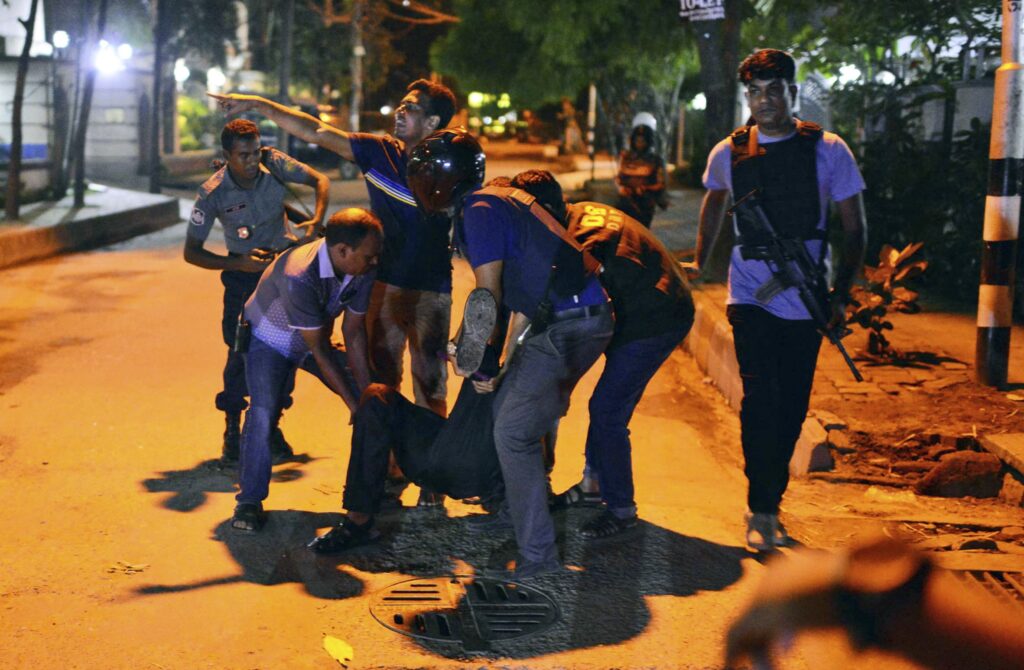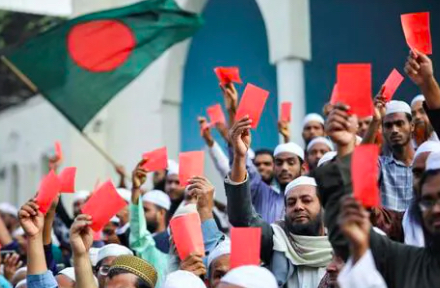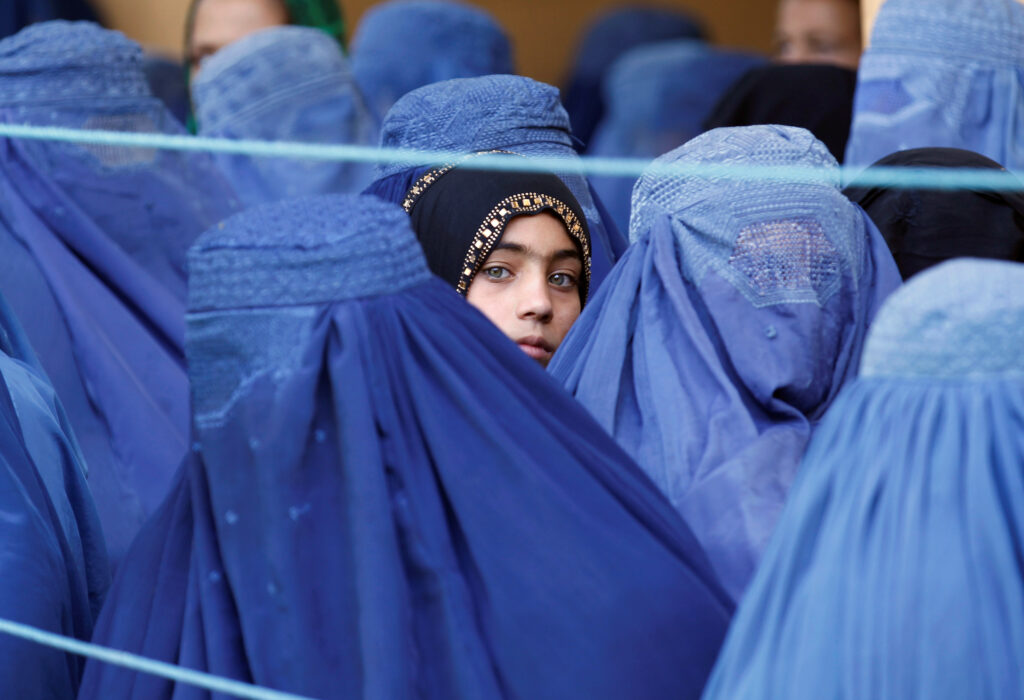MANTRAYA POLICY BRIEF#17: 04 JULY 2016
BIBHU PRASD ROUTRAY
Abstract
Whether global or local jihad consumed the lives of the Bangladeshis and foreigners on 1 July 2016 is irrelevant. An effective counter-terrorism response is about the state’s demonstrated inclination to provide a honest assessment of the challenge and capacity to initiate steps to mitigate the threat. Bangladesh’s “Insurance Agent’s approach to terrorism” underlines that it is not even willing to address the threat.

The Awami League government has responded to the 1 July 2016 terrorist attack on the Holey Artisan Bakery along expected lines. The statement released on 4 July provides profiles of the terrorists and reiterates that they belonged to the home grown Jama’atul Mujahideen Bangladesh (JMB) and not to the Islamic State (IS) as claimed by the outfit immediately after the attack. The statement underlines Dhaka’s refusal to stray from its well known “Insurance Agent’s approach to countering terror” and a misconceived notion that good counter-terrorism begins by playing down the threat.
Soft-peddling the organised killings and pursuing an “Insurance Agent’s approach to countering terror” in the previous 18 months could have created the base for the attack on the Holey Artisan Bakery.
In the months prior to the attack on the western-style cafe in Dhaka’s diplomatic zone, terrorist attacks claimed the lives of about 50 persons across the country. On most occasions machete-wielding attackers on motorbikes slaughtered Hindu priests, Buddhists, atheists, secular bloggers, and also foreigners. More than half of the attacks were owned up by the Islamic State. But the government not only issued repeated denials, but appeared to rationalise the killings. ‘The victims should not have aroused the religious passions of the majority community’, was the underlying sermon in official press releases. Soft-peddling the organised killings in the previous 18 months could have created the base for the attack on the Holey Artisan Bakery.
Politics, however, explains the logic of the government. Prime Minister Shaikh Hasina wishes to prevent Bangladesh’s slide into chaos and inching proximity to attaining a failed state status. Accepting the presence of the Islamic State would weaken its own position and strengthen the opposition’s hands. In a politically polarised country, where more number political opponents rather than extremists are behind bars, nothing can be more suicidal than the acceptance that the regime has abysmally failed to maintain law and order. As recently as on 8 June 2016 the Information Minister Hasanul Haq Inu had claimed, “Their (terrorists’) strength has waned. at least in one respect, they government is successful as they could not attack big government establishments or highways.”
Whether global or local jihad consumed 20 lives on 1 July 2016 is irrelevant. Whether the JMB or the Islamic State prevailed as the authorities dithered over launching a commando operation or engaging in peace talks with the terrorists is meaningless.
But from the victims’ and their families’ point of view being killed by the local Bangladeshi JMB cadres is no less painful and unacceptable than by the killers affiliated to the Islamic State. Whether global or local jihad consumed 20 lives on 1 July 2016 is irrelevant. Whether the JMB or the Islamic State prevailed as the authorities dithered over launching a commando operation or engaging in peace talks with the terrorists is meaningless. The fact remains that victims of the Holey Artisan Bakery attack had much in common with the dead bodies in previous attacks in Orlando, Brussels, Istanbul, and Paris. All of them were killed in the name of religion. Ability to recite Quran apparently decided whether one emerged alive or dead from the attack site in Gulshan.
The April 2016 threat issued by Shaykh Abu Ibrahim al-Hanif, Amir of the Khalifah’s Soldiers in Bengal may or may not have led to the attack on the Holey Artisan Bakery. Widely believed to be a Canadian national of Bangladeshi origin Tamim Chowdhury, al-Hanif had claimed, “We let our actions do the talking. And our soldiers are presently sharpening their knives to slaughter the atheists, the mockers of the Prophet and every other apostate in the region.” Slitting of throats of the victims was the reported modus operandi adopted by the young terrorists in the restaurant on 1 July.
How did a battered militancy that had lost all its top leaders and safe houses in the country manage to raise its ugly head? How does one explain the radicalisation of young men belonging to well-to-do families who went to universities and posh schools and not to madrassas?
Even if one accepts the government claim that the terrorists belonged to the JMB and not to the Islamic State, several questions remain unanswered. How did a battered militancy that had lost all its top leaders and safe houses in the country manage to raise its ugly head? How does one explain the radicalisation of young men belonging to well-to-do families who went to universities and posh schools and not to madrassas? Why did son of a secular Awami League politician wish to become a blood spilling terrorist? How did these young men access sophisticated weapons and train themselves for months before converging on the Bakery? Followers of the Afghanistan inspired Islamist militancy in Bangladesh would recall that the JMB in its entire history never managed to organise a single attack similar to the 1 July attack. How did then the outfit manage to achieve a shocking technology and skill upgradation without the state’s agencies noticing it? Is it achievable without external influence of an outfit like the Islamic State which has been urging Muslims to carry out lone-wolf attacks? Assumed affiliation and not organisational command has played a key role in most Islamic State-inspired attacks outside Iraq and Syria.
“What’s in a name? A rose by any other name would smell as sweet”, wrote Shakespeare in Romeo and Juliet. Deaths of civilians and security force personnel in terrorist attacks produce the same foul smell whether orchestrated by the Islamic State or a local ragtag group. An appropriate counter-terrorism response is neither about heightening or down playing the threat. It is about the state’s demonstrated inclination to provide a honest assessment of the challenge and capacity to initiate steps to mitigate the threat. Countries with resources far larger than that of Bangladesh have struggled to prevent the wave of terrorist attacks in recent times. Bangladesh may succeed or may completely fail in its endeavour. However, its ostrich like response to the attack that seeks to produce a self defeating narrative will only end up playing into the hands of the extremist forces.
(Dr. Bibhu Prasad Routray is the Director of MISS. This policy brief has been published under Mantraya.org’s Mapping Terror and Insurgent Networks project. All Mantraya publications are peer-reviewed.)



